- Home
- Hammond Innes
The Strange Land Page 12
The Strange Land Read online
Page 12
‘What’s he want to see me about?’ I asked.
She shrugged her shoulders. ‘I expect, like everybody else, he is curious to know what you are going to do.’
So they were all waiting for me to admit defeat. Frehel was all right. We got on quite well together. But officially he didn’t approve of an English missionary at Enfida. A bitter sense of loneliness had come over me.
I got up then. I felt I couldn’t stay in that room any longer. It was so cold and dreary. And I wanted to think. ‘I’m going for a walk,’ I told Jan.
It was brighter outside. A cool wind blew down off the mountains, but the sun was warm. I walked up through the place of the olives, conscious of the stares and whispers of the crowd. I walked steadily up the road until I came to where the landslide had spilled across it and the gang of workmen were cutting into it with their shovels. I turned off to the right then and began to climb up through the olive groves, climbing towards the top of the slide. Maybe the attitude of the Berbers of the mountain villages would be different. There were too many Arabs in Enfida. Tomorrow I would go up to the villages at the head of the ravine.
It was dusk when I got back to the auberge. The single electric light bulb under its white porcelain shade barely illuminated the big, empty room. A table had been laid for the two of us in a corner. I stopped to warm myself at the stove. The cat was sitting in Madame’s chair half-concealing a copy of La Vigie. A headline caught my eye: TANGIER YACHT MYSTERY - What Happened to Second Man? - Police Search for Missing Captain Intensified.
I pulled the paper out from beneath the recumbent cat and glanced quickly through the news story. It was date-lined Tangier… and it is now known that there was a second man on board the yacht. His identity is being kept secret, but the police state that the search for M. Roland Wade, captain and owner of the Gay Juliet, who disappeared from the Hotel Malabata in Tangier two days ago, has been intensified. They wish to question him about the fate of this second man. Wade stated, when he was rescued from the wreck, that he was the only person on board. It is thought that Wade, who is a short, dark-haired man, may have slipped across the International Frontier at some unguarded point into Spanish or French Morocco. A close watch is being kept on all forms of transport and a description has been … There followed a description of Jan as he was when he had shared my room at the Malabata and a brief account of how the yacht was wrecked in the gale. And then: Wade was last seen when he left the Hotel Malabata in the company of M. Philip Latham, the Englishman who rescued him from the sea. M. Latham is believed to have returned to French Morocco where he is living. Inquiries are being made by the Moroccan police.
I sat down in a chair and stared at that last line. So they would be coming here to question me! First the landslide, and now this! I dropped my head into my hands. It was too much. Everything seemed to have gone wrong. And then I was staring at that news story again, suddenly conscious of the significance of that word fate. They wish to question him about the fate of this second man. I wondered how they knew for certain that there had been two men on the boat. But it didn’t matter. The point was that they knew. I licked my lips, which had suddenly gone dry. The police had leapt to the same conclusion that I had.
I grabbed the paper again and ran up the stairs. It was inevitable. What else could they think? The man they thought was Wade had disappeared and his companion on the boat had never arrived. On the face of it, it could only add up to murder and now they’d go searching and questioning until they found him. I ran quickly from bedroom to bedroom. But they were all empty. Jan wasn’t there. I went back down the stairs and shouted for Madame. The kitchen door opened. ‘Dinner is almost ready,’ she said.
‘Where’s Dr Kavan?’ I asked her breathlessly.
‘He has gone out.’
‘Where? Did he say where?’ I got a grip on myself and added more calmly, ‘When did he leave?’
‘About half an hour ago.’ She paused and I was conscious of her beady eyes watching me curiously. ‘He has gone to see Monsieur Frehel.’
‘Frehel?’ Had the police traced Jan already? Had they guessed at the truth? Oh God! What a mess! And then I pulled myself together and asked Madame to bring me a fine a I’eau. They’d discover that he was the man who’d come ashore from the wreck. I crossed the room and sat down at the table that had been laid for us. They’d think he’d taken Wade’s identity for fear of being accused of killing the man. What else could they think? I rubbed my hand across my eyes. Poor devil! And there was his wife, waiting in Tangier. She would be brought into it, too. I tried desperately to think of a way out for him, but it was no good. The only hope was to tell them the truth. It would involve Vareau, but that couldn’t be helped. They would have to be told the truth.
Madame brought me my drink and settled herself in her chair, holding the cat in her lap, stroking it gently and watching me with a gossip-greedy look in her small eyes. ‘Alors, monsieur - about this affair in Tangier. I see your name is mentioned in the paper.’
But I was saved her cross-examination by the arrival of a car. It was a Frenchman wanting a room for the night. He was a man of medium height and he wore a grey felt hat and a raincoat over a light suit. I didn’t really take much notice of him then. He was one of those men who fit quietly into their surroundings. He might have been a commercial traveller. Madame took him up to show him his room and I sat staring down at the paper, not reading it, just wishing I was done with the whole business.
And then Jan came in. ‘I had to go down and see the Civil Controller,’ he said.
‘What happened?’ I asked quickly. ‘What did he want? Does he know who you are?’
‘Of course. I showed him my papers and we talked — ‘
‘I don’t mean that. Does he know you’re the man who posed as Wade in Tangier?’
‘No. Why should he?’ He seemed surprised.
‘Why? Because the police…’ But of course, they couldn’t know all that yet. ‘Have you seen this?’ I thrust the paper across to him.
He picked it up and I heard the quick intake of his breath, saw the knuckles of his hand whiten as his grip tightened on the pages. He dropped into the chair beside me. ‘How do they know I was on the boat? They can’t know. It was dark when I joined Gay Juliet and we sailed in the early hours of the morning, before it was light. I’m certain I wasn’t followed.’ He didn’t say anything more for a moment as he read the whole story through. Then he put the paper down and looked at me. ‘This is how it started before,’ he said. ‘There was a lot of publicity about my being taken off secret work, that was how they knew I was worth bringing back to Czechoslovakia. Once the International Police reveal my name to the newspapers …” He gave a little sigh and shrugged his shoulders hopelessly. ‘They’ll be coming here to question you, I suppose.’
I nodded.
‘What are you going to do? Frehel wants to see you in the morning. At ten o’clock. He asked me to let you know.’ He stared at me. ‘What are you going to tell him?’
‘The truth,’ I said.
‘No. You can’t do that. Not yet.’ His voice was urgent, his grip on my arm like a vice. ‘I need time.’
‘Don’t be a fool,’ I said. ‘The truth is your only help.’
‘How do you mean?’ He had completely failed to understand the implication of the story.
But when he asked me to put my thoughts into words, I couldn’t do it. He didn’t see it the way I did - the way the police must see it. Perhaps it was better if he didn’t. That way his denial would be more convincing. And then he said something that put the thing out of my mind for the moment. He said, ‘Philip. I want you to do something for me. I want you to confirm what I have just told Frehel - what you arranged back there in Tangier. I want you to tell the police when they come that I flew out from England direct to Casablanca.’
‘It’s no good,’ I said. ‘They’ve only to check at Paris or London.’
‘I know. But I still want you to do it. All I need is
four days. In four days I can get down to Foum-Skhira.’
‘Foum-Skhira?’ I stared at him.
‘I have to see Caid Hassan d’Es-Skhira. It’s about Kasbah Foum.’
‘What’s Kasbah Foum got to do with you?’ I demanded. And then I was suddenly angry. All the bitterness of the last few hours was concentrated on this one thing. ‘You never intended to work at the Mission, did you?’ I accused him. ‘It was just an excuse. You used my need of a doctor — ‘ But I stopped there. How could he have known then about Wade and Kasbah Foum? I was tired and my mind was confused.
He leaned forward, his hand on my arm again. ‘Please, Philip. Listen. I have a proposition — ‘ He stopped abruptly as footsteps sounded on the stairs behind him.
It was the Frenchman. He stood at the foot of the stairs for an instant, staring at us. Then he went over to the table in the far corner.
Jan picked up the paper again. I saw him glance several times at the newcomer. Then he leaned towards me. ‘We’ve got to talk this over. There’s something I haven’t told you.’
But Madame came in then and I motioned him to be silent. She went through into the kitchen and for a while the only sound was the ticking of an alarm clock somewhere behind the bar. The darkness and the dreariness of the room, combined with Jan’s tenseness, began to get on my nerves. The room had an unreal quality. It looked like a stage set, with its bar and its white-tiled stove and the faded posters on the flimsy wooden walls.
The soup arrived, and then Madame waddled in, carrying a special bottle of wine carefully in her two fat hands. She took it across to the Frenchman. Monsieur Bilvidic she called him, and her throaty voice smarmed over the hard syllables of his name as she bent obsequiously over his table. Evidently he wasn’t just an ordinary traveller. He was someone of importance - an official. His face was pale, almost sallow, and there were little pouches under his eyes, like half spectacles on either side of his thin, sharp nose.
Once our eyes met. It was a quick, appraising glance, and it left me with a faint feeling of hollowness in the pit of my stomach.
Madame had seated herself by the stove again. For a while she concentrated on her food, but once or twice she glanced in my direction. At length she said, ‘I was asking you, monsieur, about that affair in Tangier.’ And when I didn’t say anything, she added, ‘You’ve read the paper, haven’t you? What happened to this man after he left the Hotel Malabata with you ?’
I glanced quickly across at the Frenchman. But he was concentrating on his food. He might not have heard her question. ‘Until I read the paper I hadn’t realised the police were looking for Wade,’ I told her.
‘But what happened to him?’
‘That’s something I shall have to tell Monsieur Frehel in the morning,’ I said. A cold sweat had broken out on my forehead. The man was concentrating too much on his food. He must be listening.
But Madame was persistent. She sat there, feeding the cat pieces of fish in her fingers and asking questions. And because I couldn’t just sit there and refuse to say anything, I told her about how I had seen the wreck and brought Wade back to my room at the hotel, all the things, in fact, that the International Police already knew. And whilst I was talking I was conscious of Jan’s growing nervousness.
The meal was over at last and I got to my feet, excusing myself by saying I was tired. Jan rose, too, and Madame saw us to the foot of the stairs. ‘Dormez bien, mes enfants.’ Her little beady eyes smiled at me maliciously.
We went upstairs to the narrow landing that ran the length of the inn. ‘Who was that man?’ Jan asked.
‘Your guess is as good as mine,’ I answered.
‘You mean — ‘
‘We’ll know in the morning,’ I said and pushed open the door of my room.
‘Philip. I want to talk to you about Kasbah Foum.’
‘Oh, damn Kasbah Foum!’ I said. ‘I’m tired now.’
And I went into the bedroom and closed the door behind me.
What did he want to keep talking about Kasbah Foum for? Hadn’t he got enough problems without trying to involve himself in something that concerned people like Kostos and Ali d’Es-Skhira? I was thinking of the Frenchman back there in the bar, talking to Madame, learning all the gossip of the place.
I sat down on the bed and stared miserably round the room. It was a sordid little box of a place with a big, brass-railed double bed that sagged in the middle and the bare minimum of furniture - a wash-stand, a tin slop pail, a chest of drawers, a wooden chair and a small built-in cupboard. The flaking paint patterned the walls with a stipple of little shadows cast by the naked electric light bulb. I shivered in the cold that struck up from the concrete floor.
I had a quick wash and went to bed. Somewhere out in the darkness a tam-tam throbbed, accompanying the queer, wailing cry of women singing. It went on and on, and then a donkey began to bray, a harsh, sobbing note as though it were slowly being strangled. I heard Bilvidic come to bed and then the auberge settled down to sleep and the only sound was the tam-tam beating out there in the night.
Gradually the moonlight filtered into the room. A little wind had got up and I listened to it moaning round the galvanised iron roof, searching for cracks in the old building.
And then I heard a movement in the passage outside. The catch of the door scraped as the handle was turned and the door opened and Jan’s voice whispered, ‘Are you asleep, Philip?’
‘No,’ I said. ‘What is it?’
He came in and shut the door gently behind him. ‘Mind if I put the light on?’ There was a click and I blinked my eyes.
‘What’s the trouble?’ I asked.
‘Nothing. I wanted to show you something.’ He came and sat on the bed. He was still dressed and he had the raincoat he’d bought in Marrakech wrapped tightly round him. ‘I’ve been thinking,’ he said. His manner was quiet as though he’d made up his mind about something.
‘Well?’
‘I’m leaving for the south tomorrow. I would like you to come with me. No,’ he added quickly. ‘Don’t say anything. Have a look at this first.’ He pulled an envelope out of his pocket and handed it to me. ‘Please. Examine it.’
It was one of those stiff linen envelopes, but it had been softened and creased with age. It was damp, too, and the remains of the broken seal were indecipherable. Inside was a bulky document to which had been attached a note in French scrawled on a sheet of cheap notepaper that was torn and dirty along the creases where it had been folded. I sat up in bed and twisted round so that the light fell across my shoulder on to the document. It opened out into a stiff sheet of parchment covered with Arab writing. The ink was faded with age, but the words kasbah foum, written in capitals, caught my eye. And then, farther down, I saw the name Marcel Duprez. The name occurred several times and the document was signed Caid El Hassan d’Es-Skhira, and some sort of seal had been affixed.
‘But this is the document Kostos wanted,’ I exclaimed.
‘Yes.’
‘You crazy fool!’ I said, staring up at him. ‘Why didn’t you let him have it? If you’d given it to him — ‘
‘Kasbah Foum belongs to me.’
But. I didn’t believe him. How could it belong to him? ‘You took those deeds from Wade,’ I said. ‘Wade was acting for Ali and you took them — ‘
‘No,’ he said. ‘Wade never had the deeds. He offered me five hundred pounds if I’d give them to him and renounce my claim to the place. But I wouldn’t sell. Kasbah Foum is mine.’ He said it fiercely, possessively.
I pushed my hand across my eyes. ‘I don’t understand,’ I said. ‘How can this place belong to you? You’ve never been in Morocco before. Land like that isn’t bought and sold — ‘
‘Those deeds were given me by Marcel Duprez. He was the man I told you about in Marrakech, the man who died in that cellar in Essen.’ He stared at me, frowning angrily. ‘You don’t believe me, do you? Why do you think Wade agreed to take me on his boat? How do you think we met in the first pla
ce? I didn’t contact Wade. He contacted me.’ He pointed to the note pinned to the document. ‘If you still don’t believe me, take a look at that note. It was written by Marcel Duprez to the lawyers just before he died.’
I smoothed out the tattered note attached to the document. It was written in French in a shaky hand and addressed to Lavin, Roche et Lavin, of Rouen:
Dear Monsieur Roche,
The bearer of this note is Dr Jan Kavan, who is here with me in this abominable town of Essen. In the event of my death, he will come to you after the war. You will give him the document relating to Kasbah fount in French Morocco. This note you will regard as a codicil to my will. Being unable at this time to write to you direct, I hereby instruct you to ignore any illegality there may be in this method of making my wishes known to you and to carry out these instructions. Dr Kavan knows that Caid Hassan’s confirmation of this bequest is necessary to substantiate his claim to the ownership of Kasbah Fount and he holds the necessary letter to Caid Hassan, which he will show to you on request.
The note was signed Marcel Duprez and dated 22 September 1944. So the Marcel Duprez who had fought at Foum-Skhira with the Legion and the man who had died in a cellar at Essen were the same! And Kasbah Foum, subject to Caid’s confirmation, belonged to Jan. ‘But if you’re so interested in the place, why didn’t you get your title to it confirmed before?’ I asked him.
‘That’s what I should have done. It’s what I promised Marcel. As soon as the Allies arrived in Essen and I was released, I went to Rouen. I saw Monsieur Roche and he gave me the deeds. But — ‘ He shrugged his shoulders awkwardly. ‘There was so much to do in Czechoslovakia. I returned to Skoda and there was my research work, and then Karen and I were married. To be the owner of a little patch of desert somewhere in Morocco — ‘ He gave a short laugh. ‘It was absurd, you know. Even if there was silver there … I had plenty of money and I was happy. I put the deeds away and forgot all about them. Also I forgot about my promise. The Berbers meant nothing to me.’ He paused and then added, ‘But afterwards, when I was in England, I found those deeds among some papers Karen smuggled out to me. And then it wasn’t absurd any more. It was all I owned in the world.’

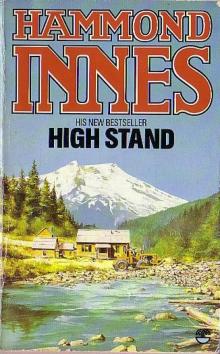 High Stand
High Stand The Doomed Oasis
The Doomed Oasis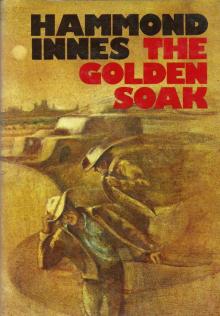 Golden Soak
Golden Soak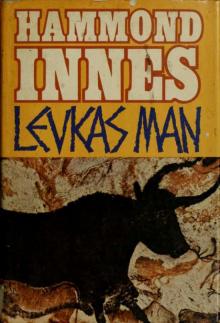 Levkas Man (Mystery)
Levkas Man (Mystery)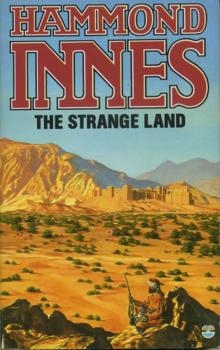 The Strange Land
The Strange Land Dead and Alive
Dead and Alive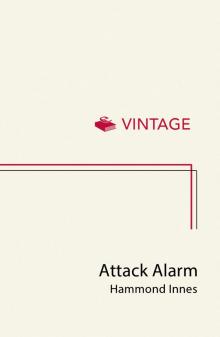 Attack Alarm
Attack Alarm The Strode Venturer
The Strode Venturer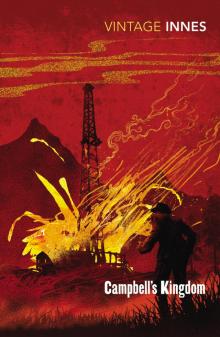 Campbell's Kingdom
Campbell's Kingdom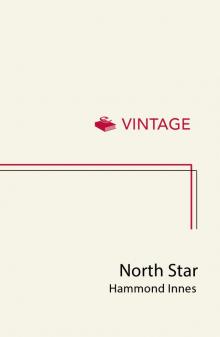 North Star
North Star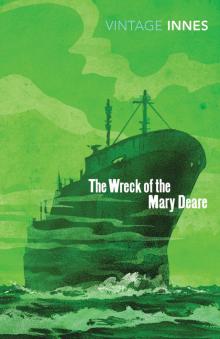 The Wreck of the Mary Deare
The Wreck of the Mary Deare The Lonely Skier
The Lonely Skier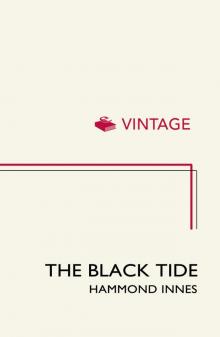 The Black Tide
The Black Tide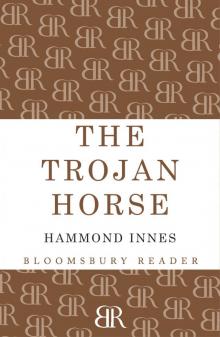 The Trojan Horse
The Trojan Horse Medusa
Medusa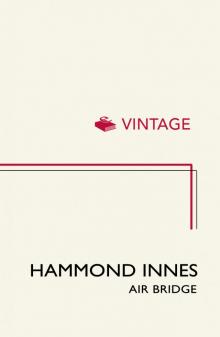 Air Bridge
Air Bridge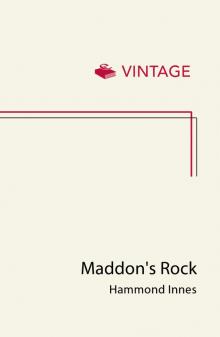 Maddon's Rock
Maddon's Rock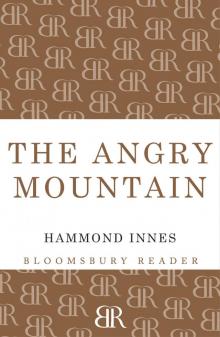 The Angry Mountain
The Angry Mountain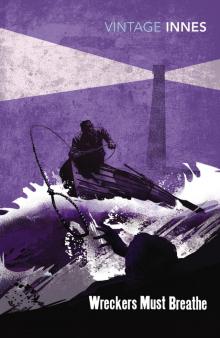 Wreckers Must Breathe
Wreckers Must Breathe Solomons Seal
Solomons Seal The White South
The White South